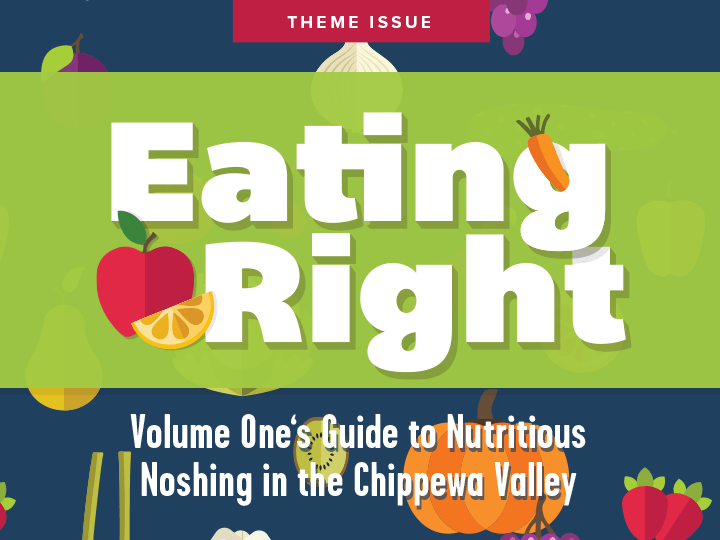Marshfield Medical Center-Eau Claire: At the Heart of Heart Care
proper food and lifestyle choices pivotal in overall health
Marshfield Medical Center - Eau Claire, by Volume One Partner Content

To better your odds of having a long, heart-healthy life, eating the right foods is an overlooked but critical component.
“Nutrition is one of the most powerful tools we have to take care of our health,” said Marshfield Medical Center-Eau Claire Dietician Ashley Short. “Finding your inner motivation to make healthy lifestyle changes is very important, because if we don’t have a valuable reason to make change happen, it is easy to not follow through. For example, your personal motivation to eat healthy and exercise may be to improve your overall health and longevity or to be more active with your children or grandchildren. It is important to find your ‘why’ in life.”
Making lifestyle changes may seem overwhelming at first, but even making small changes can ultimately make a positive impact on your health. Small changes often lead to big changes and positive outcomes over time.
Nutrition’s effect on the heart
Nutrition and physical activity play a critical role in the prevention or management of heart disease.
“Some things are out of our control, but we can make conscious, healthy choices about what goes in our body,” said Dr. Pramod Kariyanna, cardiologist at Marshfield Medical Center-Eau Claire. “Eating heathy and regular exercise have a significant effect on heart health.”
“Some things are out of our control, but we can make conscious, healthy choices about what goes in our body.” –Dr. Pramod Kariyanna, cardiologist at Marshfield Medical Center-Eau Claire
Dr. Kariyanna also noted the importance moderation with portions and quantity in our diets.
“Everything is big in the U.S., which, when it comes to food is not so healthy,” he said. “But in moderation it won’t have that effect on the body. Greek physician Hippocrates had a saying that has stood the test of time. ‘Food is medicine and medicine is the food.’ Our diet and what we eat is at the heart of heart care.”
What foods should we eat?
Heart healthy eating includes a variety of fruits, veggies, whole grains, low-fat dairy products, leaner meats such as skinless poultry, fish, nuts, healthy oils such as olive or canola oil, and limiting our intake of saturated fats like whole milk, cheese, butter, and higher fat meats such as bacon and hot dogs.
“Try to think of food as fuel,” Short said. “If you are active and not fueling your body properly, this can affect your energy levels and ultimately prevent you from achieving your personal fitness goals or even make it more difficult performing tasks at your job or focusing in school.”
Having healthy carbohydrates and protein before exercise, such as whole wheat toast with peanut butter and low fat milk, will provide you with more sustainable energy than having a doughnut for breakfast, Short said. If you don’t have much time before your workout, having some easily digestible carbohydrates that are nutrient dense such as a banana 30-60 minutes prior is good.
A minimum of five cups of fruits and veggies each day is important in heart health. Here are some suggestions to add to your grocery list for the next time you’re at the store:
Fish: those high in omega 3-fatty acids such as salmon, tuna, mackerel, herring, and trout. The American Heart Association suggests two servings of fish a week. Again, choose a healthy method of cooking.
Nuts: almonds and walnuts are high in mono-unsaturated fats, or healthy fats, but ¼ cup of nuts is 200 calories.
Oats: oatmeal is high in soluble fiber, which acts like a digestive sponge to soak up cholesterol so you excrete it rather than carry it in your blood. Don’t use oatmeal packets, though, since they contain higher amounts of sugar. Use old-fashioned, quick-cooking, or steel-cut oats instead.
Berries: all berries, like blueberries and strawberries, are high in antioxidants that help decrease blood pressure.
Beans and legumes: they’re high in fiber, a good protein alternative without unhealthy fat.
Tomatoes: they are very high in potassium and antioxidants.
Dark leafy greens.
Avocados: these add great heart-healthy fats to a diet – but watch the guacamole ingredients.
Extra-virgin olive oil: substitute EVOO for butter, since olive oil is the “Mediterranean butter.” This oil contains the healthier mono-unsaturated fat.
Garlic and onions: these are said to reduce inflammation in the body.
Dairy: it’s great for calcium but choose low- or no-fat options.
“Healthy eating definitely matters,” Dr. Kariyanna said. “Healthy eating is a great option for people equally whether they have heart problems or just want to prevent future heart problems. For some things, our genetics or family history is out of our control, but conscious choices when it comes to eating, exercise or lifestyle choices can have a huge impact on your heart health and your overall health.”
Don’t know where to start? Check out some recipes from the American Heart Association at recipes.heart.org to help get you started on your path to a healthier lifestyle.
Learn more about Marshfield Clinic Health System at marshfieldclinic.org.



